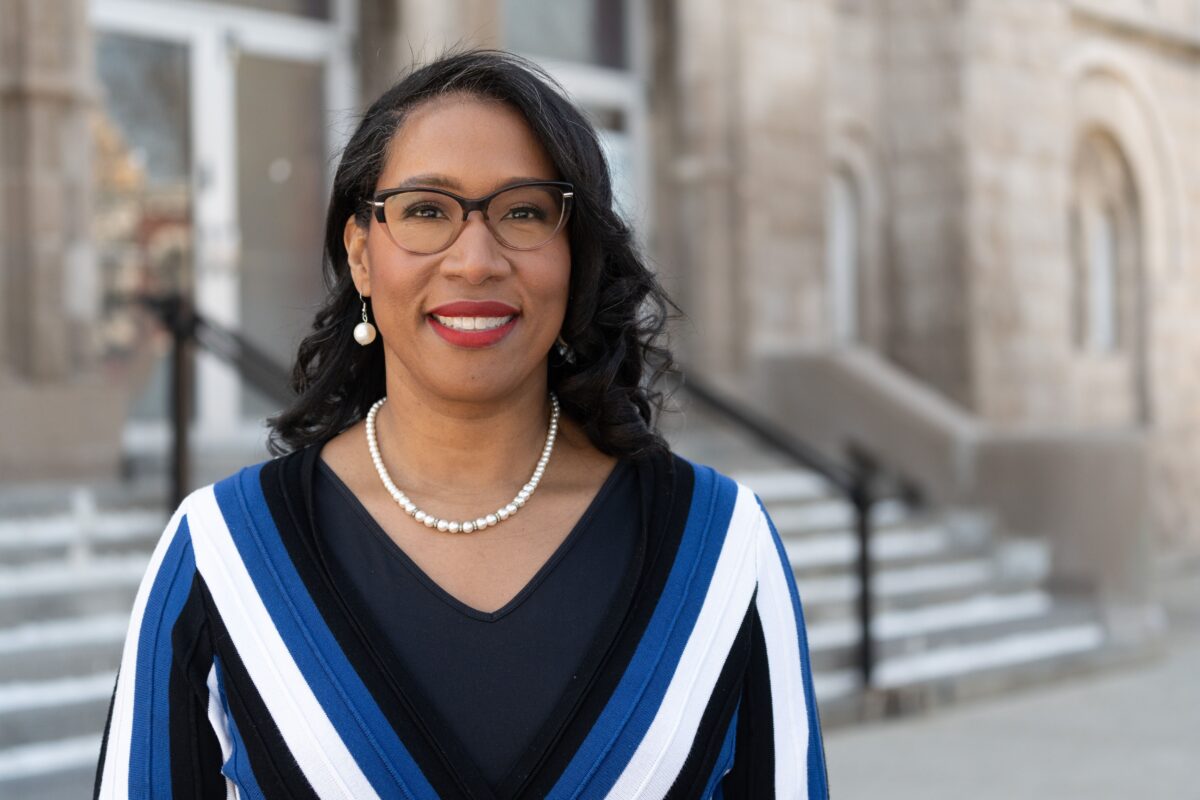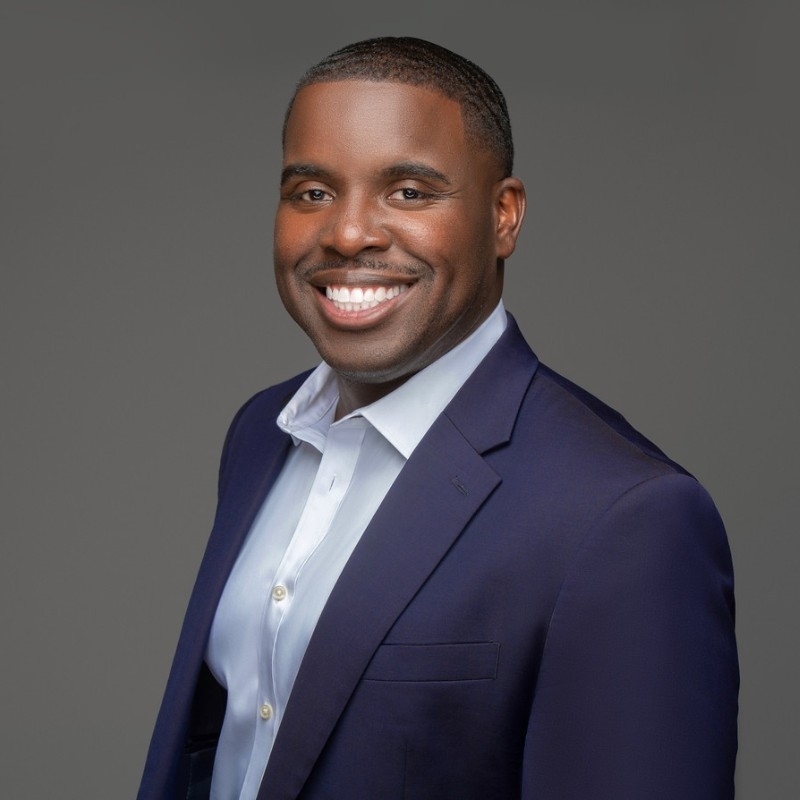Rep. Danny Davis faces fractured primary field
Davis faces an Israel critic on his left, and a pair of pro-Israel challengers from the moderate wing of the party

Michael A. McCoy/Getty Images
Rep. Danny Davis (D-IL) speaks during a news conference on July 24, 2020, in Washington, D.C.
Rep. Danny Davis (D-IL), the longtime Chicago congressman who has had a rocky relationship with the Chicago Jewish community over his stances on Israel, faces a new wrinkle in his bid for reelection — a broader field of challengers that could upend the dynamics of the March 19 Democratic primary.
Progressive Kina Collins is making another bid to unseat the longtime congressman, after falling six percentage points short of Davis in the 2022 primary. Collins is an activist backed in the 2022 cycle by the Justice Democrats who has described Israel’s military operation in Gaza as “genocide,” called for an immediate cease-fire days after the attack on Israel and supported conditioning aid to Israel during her previous campaign.
But the vote is likely to be further divided this cycle, with Chicago Treasurer Melissa Conyears-Ervin and former political staffer and nonprofit leader Kouri Marshall challenging Davis from the more moderate wing of the party. Educator Nikhil Bhatia is also running for the 7th Congressional District seat, which Davis has held since 1997.
Davis has supported placing restrictions on U.S. aid to Israel and voted present on a resolution condemning the Boycott, Divestment and Sanctions movement targeting Israel. He offered praise for Louis Farrakhan, the Nation of Islam leader notorious for antisemitic rhetoric, which he subsequently walked back.
Frank Calabrese, a political consultant who lives in the district, told Jewish Insider he believes Davis is still favored to win the race, and described it as a three-way competition among Davis, Collins and Conyears-Ervin.
“I think he’s going to be there as long as he wants to be there,” Calabrese said. “That name is just so strong in the city of Chicago. It’s universally known. And he’s universally liked by the Black community… even in non-Black precincts, like where I live downtown, he does very well just because of his name ID.”
He explained that Davis has struggled more in the more affluent, non-Black areas of the city, where he expects Collins to improve her performance. But those areas remain a small portion of the district.
Conyears-Ervin benefits from her own name recognition as treasurer, as well as a strong political apparatus — her husband is a city alderman. But, Calabrese noted, she might struggle in this election due to an ongoing ethics scandal.
That controversy has led some in the pro-Israel community to give Marshall additional consideration, but Calabrese said he’ll need a blockbuster fourth-quarter fundraising haul to launch himself into more serious consideration for the seat.
“I think the three-way race benefits Kina Collins,” Calabrese said, anticipating that Conyears-Ervin might pull votes from Davis in the majority-Black West Side. He added that left-wing candidates have been gaining ground in Chicago in recent years. “I think you have to take [Collins] seriously.”
Conyears-Ervin and Davis, Calabrese explained, are likely to be “fighting over” similar voters — who he predicts are more likely to stick with Davis — whereas Collins has a more “distinct” voter base.
Ultimately, he said, Collins is likely to improve on her performance in 2022, even if she’s likely to fall short of victory.
Conyears-Ervin told JI she decided to challenge Davis because she feels that “D.C. truly is not working for working families… We need proper representation, someone that understands the challenges of today” and can “bridge the gap between the communities of the 7th Congressional District.”

Marshall told JI that he’s running for Congress because the district is “looking for a change” and residents want “greater return on the investments — they’re looking for better schools, increased job prospects, decreased crime.” He said they’ve shown there’s “a strong desire for change.”
Marshall also placed himself solidly in the moderate camp, vowing to work across the aisle and look for a Republican roommate in Washington if he’s elected.
Both Conyears-Ervin and Marshall are reliable supporters of Israel, a marked difference from both Davis and Collins.
“The Israel-U.S. relationship is extremely important, and it’s important to all of us,” Conyears-Ervin told JI. “One thing that I think I can really bring to this district, as the congressperson, is that voice to really speak to all constituents and all communities to help us to understand that this relationship… affects all of us.”
She said she’d engaged in conversations with members of the Jewish community and worked to understand their challenges and concerns before announcing her run to Congress.
“It is within the United States’ interest to make certain that Israel has a right to defend itself,” she continued. “So I would like to make certain that Israel has the resources it needs.”
Marshall said that, watching the Hamas attack unfold on Oct. 7, he “wished that I could do something.”
He pushed back strongly against calls for a cease-fire, explaining, “if someone kidnapped your wife and kids, and you didn’t have them back just yet, would you be calling for a cease-fire or would you be engaging in the kinds of activities that could help you recover your loved ones?”
Marshall rejected the idea of conditioning or placing other restrictions on U.S. aid to Israel, and added in a position paper shared with JI that he supports legislation to expand U.S.-Israel defense collaboration programs in emerging technologies.
“I don’t understand why we have so many members of Congress who don’t understand why it is important for us to support Israel, or even candidates in my race [who] may hold those same notions,” Marshall said.

He said that he supports aid to the Palestinians in the Gaza Strip and an eventual two-state solution, but emphasized that there is no path forward for the Palestinians without eliminating terrorist groups.
“Iran is one of the greatest threats to peace and humanity in every corner of the globe. And I won’t stand for a nuclear-armed Iran,” he continued. “I’m going to stand with the people of Israel.”
He said he supports stronger sanctions and other measures to claw back funding to and increase monitoring of Iran to combat its nuclear program. In his position paper, Marshall said he’d specifically support new sanctions to stop Iran’s oil exports.
He said in the paper any potential nuclear deal must permanently cut off Iran’s path to a nuclear weapon; suspend enrichment and reprocessing; end support for terrorist groups; and allow broad leeway for international inspections.
Speaking to JI the day after the administration’s first strikes on the Houthis in Yemen, Marshall said he supported those strikes — which some lawmakers have characterized as unconstitutional.
Both candidates traveled to Israel with the AIPAC-affiliated American Israel Education Foundation — Conyears-Ervin in 2023 and Marshall in 2022.
Conyears-Ervin described the trip as “overwhelming,” and said it gave her a new understanding of the “trauma” and danger that Israeli families experienced on a daily basis, even before Oct. 7. The trip included a visit to one of the kibbutzim on the Gaza border that was attacked on Oct. 7.
She added that the trip helped her draw connections between the Jewish and Israeli and Black American experiences.
“No child should have to grow up and know where the closest bomb shelter is,” she said. “No child on the West and South Sides of Chicago should experience gun violence. We don’t understand how these communities relate, and they do.”
She added that a visit to a resilience center in Israel, aimed at supporting families who have experienced trauma, had inspired plans to pursue a similar concept in her own district, to help support her community in Chicago.
Marshall said that visiting Israel was a deeply spiritual experience for him as a Christian, which brought him nearly to tears, and helped him connect with both his religion and his grandmother, who had taught him about the holy land as a child.
“It was really a spiritual awakening for me,” Marshall said, adding that he felt divine inspiration during the trip to create a mentorship program for young Black men in Chicago.
Conyears-Ervin said that the experiences of Jewish Americans facing rising antisemitism in the wake of the Oct. 7 attack “really [break] my heart,” explaining that she “knows what it means to be mistreated, simply because of the color of my skin, simply because of who I am.”
“The Jewish community, the African American community — we understand one another,” she explained.
Marshall said he’d support security grant funding to protect synagogues and other religious institutions. And he also stressed the importance of bringing together the Black and Jewish communities, invoking the legacy of Dr. Martin Luther King Jr.
“The only way” to transform the district, Marshall said, “is to make sure that I am advocating for equality and not [be] silent when it comes to antisemitism, because to be silent is to be just as, oftentimes, guilty as the [perpetrators] are.”










